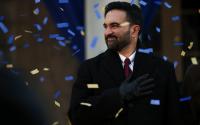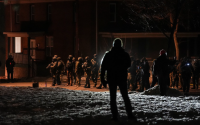|
The Turkish prosecution service went into action and Mr Dalci was charged with the crime of insulting Mustafa Kemal, better known as Ataturk, a national hero. Mr Dalci, who was held for 48 hours before being bailed, is awaiting trial and could face three years in prison.
A victim of the power struggle between defenders of the secularist state and the ruling AKP party of religious conservatives, Mr Dalci initially blamed his Sovereignty Day ordeal on an excess of grilled garlic the night before. He needed the gum to clear his breath. But then he denied chewing gum at all.
An AKP deputy leader, Dengir Mir Mehmet Firat, said: "How can you arrest someone for this? Let's assume he was chewing. It's not a crime, though it might be bad behaviour."
It is a small example of the political turmoil and violence in Turkey as officials from Ankara are due to sit down in Luxembourg today with EU foreign ministers to formally open the negotiations that Turkey hopes will end in the largely Muslim country joining Europe.
The run-up to the momentous day has been anything but smooth. Political violence, assassinations, ethnic conflict, political trials, and human rights violations in recent weeks are generating fear and instability in the country. "There is a fierce and potentially very bloody struggle going on," said Soli Ozel, an Istanbul political scientist.
Diplomats, politicians, and analysts believe the upheaval is being staged by hardline nationalists aimed at destabilising Turkey, discrediting the AKP government of the prime minister, Recep Tayyip Erdogan, and shattering its hopes of integration with Europe.
"The EU reform process has not only been halted," said Cengiz Aktar, director of the EU research centre at Istanbul's Bahcesehir University. "We're currently going through a counter-reformation."
"The main problem right now in Turkey is the power struggle between political Islam and the status quo," said a veteran leftwinger jailed for seven years in the 1970s and still wary of speaking publicly. "Turkey is divided in two and has been ever since Erdogan came to power. On the one side you have the forces of political Islam and on the other those of militant secularism."
The colossal changes driven by Turkey's European ambitions are, in broad terms, being effected by the forces of political Islam in the form of the Erdogan government and his AKP (Justice and Development) movement. While the AKP has been the motor of modernisation since coming to power in 2003, the opposition secularist elite - strong in the judiciary, the military, and the bureaucracy - is more reactionary, nationalist, and "anti-European".
In the battle for the direction of the country, the nationalists seem to be setting the agenda. "There appears to be a creeping transfer of power from the democratically elected government back to the military and security establishments and their formal, semi-formal and extra-legal extremities," the Oxford academic Kerem Oktem, a Turk, wrote this month. In recent months maverick security forces have bombed a Kurdish bookshop, and the country's best-known writer, Orhan Pamuk, has been put on trial for talking about the Kurdish conflict and first world war massacres; the case was later dismissed. Last week a prominent columnist appeared in court for stating that conscientious objection to military service is a human right. A radical lawyer entered one of the highest courts in Ankara last month and shot five senior judges, killing one. In March, there were large Kurdish riots in the south-east, which met with killings and tough reprisals from the security forces. Bombs explode several times a month.
All of these events may not be directly linked. Their provenance often remains murky in a country where rumour and conspiracy theory take precedence over facts and sober investigation. But they are fuelling tension and insecurity.
Kemal Kirisci, a Bosphorus University historian, describes the tension as a contest between the winners and losers from the process of "Europeanisation".
Whether Kurdish separatist guerrillas, Turkish nationalist hardliners - or even mainstream European Christian democrats opposed to Turkey's EU membership - "they all have a vested interest in keeping Turkey out [of Europe]. It hurts their own positions in society".
Mr Kirisci points out that there are plenty of pro-European reformists in powerful positions in the military and security services as well as anti-Europeans within the government ranks. But even Mr Erdogan's natural opponents credit him with the strongest track record on liberalisation for decades.
"I don't vote for him, but I praise him," Mr Kirisci said.
The former detainee said: "I'm a leftist atheist, he's a rightwing Islamist. Yet I still say he's the best prime minister for the country."
General elections are due by the end of next year and a new head of state, chosen by parliament, is to be elected a year from now. The presidential election, in particular, is hugely divisive and said to be the main reason for the turbulence. Mr Erdogan enjoys a huge majority, almost two-thirds, in the 550-seat parliament.
The presidency is his for the taking, should he so choose. It is also a secularist bastion and its defenders are determined it remain so.
"All these troubles, it is all about the presidency," Mr Ozel said. "The presidency is the last castle that could fall from the established elite to the AKP."
An AKP baron and parliamentary speaker, Bulent Arinc, is calling for Turkey's constitutionally enshrined secularism to be redefined. Mr Erdogan's establishment opponents are appalled. They also suspect the prime minister's pro-Europe reforms are double-edged, that he is using Europe to undermine the traditional pillars of the Turkish state, for example the military, while stealthily leading Turkey on a long trek to being an Islamic state.
Mr Erdogan has been backing down in the face of the warnings, while also increasingly resorting to conservative religious populism to shore up his power base.
In advance of today's negotiations in Luxembourg, Brussels has warned that the early reformist dynamism of the Erdogan government is going into reverse. Last week, Turkey's powerful business lobby told the prime minister that he was too concerned with religion and no longer interested in urgently needed reforms.
"Stability in this country is directly linked to the anchor of the EU perspective," Mr Aktar said. "But things may yet get worse before they get better."
Footnotes
AtaturkMustafa Kemal, known as Ataturk, was a junior army officer who became the founder and first president of the Turkish republic after the collapse of the Ottoman empire. He transformed Turkey into a modern secular state.
Sovereignty DayCelebrated on April 23, Sovereignty Day commemorates the opening of the first Turkish national assembly in 1920.
AKPThe AKP (Justice and Development) movement was formed in 2001 from ruins of previously banned Islamist parties, but leaders describe themselves as moderates and "conservative democrats". Opponents have accused it of hiding an Islamist agenda and plotting to undermine Turkey's secular democracy.
Recep Tayyip ErdoganA former mayor of Istanbul, Erdogan led the AKP to victory in 2002 elections, but was barred from becoming prime minister because of a conviction for inciting religious hatred. After his party forced through a constitutional amendment allowing him to stand for parliament, Mr Erdogan became PM in March 2003.
Kurdish conflictTurkey's war with its repressed minority of Kurds has lasted for decades. The current conflict erupted in 1984, when Abdullah Ocalan, guerrilla leader of the Kurdistan Workers' party, led the rebellion. It has claimed 40,000 lives.
First world war massacresTurkey faces international pressure to recognise that more than 1 million Armenians were massacred during a 1915 campaign of ethnic cleansing by Ottoman Turks. Turkish officials claim that most deaths were caused by hunger and disease.
 A statue of Ataturk is reflected in the window of an Islamic clothes shop in Ankara. Photograph: Tarik Tinazay/Getty
A statue of Ataturk is reflected in the window of an Islamic clothes shop in Ankara. Photograph: Tarik Tinazay/Getty 





